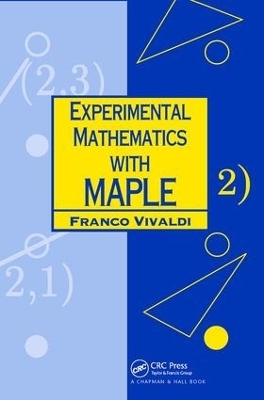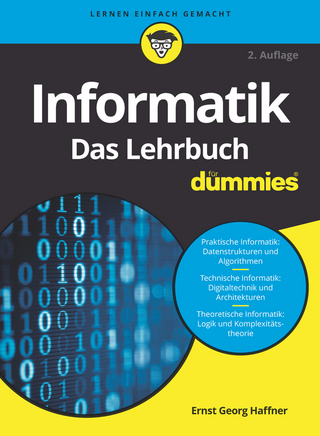
Experimental Mathematics with Maple
Seiten
2017
CRC Press (Verlag)
978-1-138-41196-8 (ISBN)
CRC Press (Verlag)
978-1-138-41196-8 (ISBN)
Introduces the foundations of discrete mathematics and develops basic computational skills using Maple. This book places abstraction and axiomatization at the end of a learning process that begins with computer experimentation. It enables readers to build a foundation in discrete mathematics, and gain experience with algebraic computing.
As discrete mathematics rapidly becomes a required element of undergraduate mathematics programs, algebraic software systems replace compiled languages and are now most often the computational tool of choice. Newcomers to university level mathematics, therefore, must not only grasp the fundamentals of discrete mathematics, they must also learn to use an algebraic manipulator and develop skills in abstract reasoning.
Experimental Mathematics with MAPLE uniquely responds to these needs. Following an emerging trend in research, it places abstraction and axiomatization at the end of a learning process that begins with computer experimentation. It introduces the foundations of discrete mathematics and, assuming no previous knowledge of computing, gradually develops basic computational skills using the latest version of the powerful MAPLE software. The author's approach is to expose readers to a large number of concrete computational examples and encourage them to isolate the general from the particular, to synthesize computational results, formulate conjectures, and attempt rigorous proofs.
Using this approach, Experimental Mathematics with MAPLE enables readers to build a foundation in discrete mathematics, gain valuable experience with algebraic computing, and develop a familiarity with basic abstract concepts, notation, and jargon. Its engaging style, numerous exercises and examples, and Internet posting of selected solutions and MAPLE worksheets make this text ideal for use both in the classroom and for self-study.
As discrete mathematics rapidly becomes a required element of undergraduate mathematics programs, algebraic software systems replace compiled languages and are now most often the computational tool of choice. Newcomers to university level mathematics, therefore, must not only grasp the fundamentals of discrete mathematics, they must also learn to use an algebraic manipulator and develop skills in abstract reasoning.
Experimental Mathematics with MAPLE uniquely responds to these needs. Following an emerging trend in research, it places abstraction and axiomatization at the end of a learning process that begins with computer experimentation. It introduces the foundations of discrete mathematics and, assuming no previous knowledge of computing, gradually develops basic computational skills using the latest version of the powerful MAPLE software. The author's approach is to expose readers to a large number of concrete computational examples and encourage them to isolate the general from the particular, to synthesize computational results, formulate conjectures, and attempt rigorous proofs.
Using this approach, Experimental Mathematics with MAPLE enables readers to build a foundation in discrete mathematics, gain valuable experience with algebraic computing, and develop a familiarity with basic abstract concepts, notation, and jargon. Its engaging style, numerous exercises and examples, and Internet posting of selected solutions and MAPLE worksheets make this text ideal for use both in the classroom and for self-study.
Franco Vivaldi is Professor of Applied Mathematics at Queen Mary University of London. His research interests include maps over arithmetical sets (finite fields, p-adic and algebraic numbers), piecewise isometries, space discretization and round-off errors.
What is Maple? Integers and Rationals. Sets and Functions. Sequences. Real and Complex Numbers. Structure of Expressions. Polynomials and Rational Functions. Finite Sums and Products. Elements of Programming. Vector Spaces. Modular Arithmetic. Some Abstract Structures.
| Erscheinungsdatum | 07.03.2022 |
|---|---|
| Reihe/Serie | Chapman Hall/CRC Mathematics Series |
| Verlagsort | London |
| Sprache | englisch |
| Maße | 156 x 234 mm |
| Gewicht | 453 g |
| Themenwelt | Mathematik / Informatik ► Informatik ► Theorie / Studium |
| Mathematik / Informatik ► Mathematik ► Graphentheorie | |
| ISBN-10 | 1-138-41196-5 / 1138411965 |
| ISBN-13 | 978-1-138-41196-8 / 9781138411968 |
| Zustand | Neuware |
| Haben Sie eine Frage zum Produkt? |
Mehr entdecken
aus dem Bereich
aus dem Bereich
Grundlagen – Anwendungen – Perspektiven
Buch | Softcover (2022)
Springer Vieweg (Verlag)
34,99 €
Eine Einführung in die Systemtheorie
Buch | Softcover (2022)
UTB (Verlag)
25,00 €


